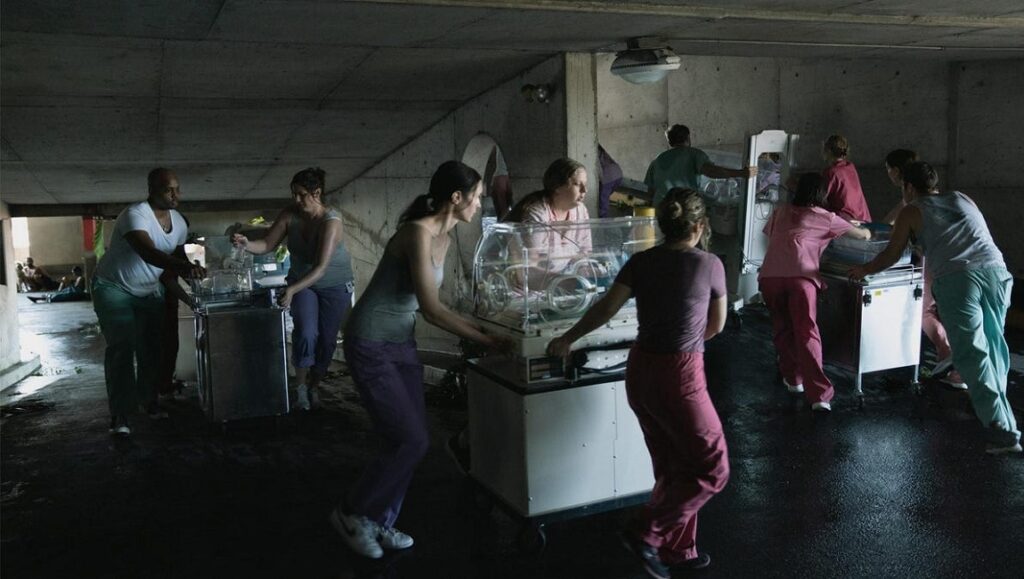In the first three days that doctors and patients were trapped inside Memorial Medical Center after Hurricane Katrina made landfall, the body count was around 20. Though unfortunate, this was in line with that of other medical centers in the area. Yet by the end of Day 5, fatalities had more than doubled. Not all deaths could be blamed on the horrible conditions or lack of lifesaving equipment: several bodies were found with lethal levels of morphine in their systems, but none of these patients were admitted for life-threatening conditions. So what happened? Carlton Cuse and John Ridley’s miniseries Five Days at Memorial is an attempt to answer that question, and Episodes 4 and 5 take us inside the bowels of the hospital during its two worst days, after the levees breached and leading up to the long-awaited FEMA-ordered evacuation.
By this point, Memorial is less a hospital than a city under siege, its once state-of-the-art facilities now resembling a third-world war zone. Both doctors and patients are battling for survival without food, water, electricity, or plumbing. The stench of death is everywhere, and temperatures are well over 100°. Outside, violence is brewing: there’s talk of snipers patrolling the city and martial law. Far from the place of refuge it was in Episode 1, Memorial’s security guards are now ordered to turn away those seeking shelter, by gunpoint if necessary. In these nightmarish conditions, a doctor’s mandate to “do no harm” seems increasingly untenable.
So far, the piecemeal evacuations that doctors cobbled together required carrying patients up the stairs in the pitch dark, through a narrow tunnel into the parking garage, and up several additional flights to a rickety helipad. Only the most healthy or able-bodied could survive the journey. Before long, doctors began discussing what to do about the pets that people brought with them to the hospital. Must they be made to suffer, since in all likelihood they won’t be evacuated with their owners? In a clear proxy for their human patients, for whom the same decision looms, Dr. Anna Pou (Vera Farmiga) and Dr. Cook (W. Earl Brown) decide the best course of action is to make them “comfortable.” The alternative is for pets and patients alike to wait alone, without food and water, for rescue that may or may not come. So when the evacuation is finally underway, hospital personnel must take the words of Susan Mulderick, the nursing director, at face value: “No living patient will be left behind.” Episode 5 ends with shots of an eerily empty hospital before anonymous footsteps approach the room of Emmett Everett, one of those left behind. By all accounts, he was lucid and not in life-threatening danger in his final moments. Yet his body, which weighed nearly 400 pounds, was among those found in the chapel.
The last three episodes of the series, directed by Wendey Stanzler, shifts gears dramatically. With the hospital closed and news coverage now focusing on the government’s botched response, Memorial’s medical personnel take a backseat to the two investigators who opened the series, Virginia Rider (Molly Hager) and Arthur “Butch” Schafer (Michael Gaston). Together, they compile forensic evidence and interview doctors and nurses to build a case against Dr. Pou, who administered the fatal doses of morphine and became the public face of Memorial’s chaos. Their chatty, mostly desk-bound efforts are a welcome respite from the harrowing events of the first five episodes. Unfortunately, this is a double-edged sword; at times, this section feels more like a standard court procedural, disconnected from the preceding horror. Both actors are compelling enough, but their two-year investigation comes across almost like a witch-hunt. Rider in particular seems to view the case in black-and-white absolutes when just about everyone else, including the medical examiner and District Attorney, acknowledge the situation’s ethical gray areas.
The most interesting outcome from these episodes isn’t the sidelining of forensic evidence, which pointed to homicide, or Dr. Pou’s arrest and exoneration. It’s not even the investigators’ baffling discovery of untouched pallets of food and water inside the hospital. Instead, it’s the interviews with various Memorial and LifeCare personnel, which reveal that even within the hospital, there was no consensus as to whether Dr. Pou did the right thing. Dr. King was so appalled that he reached out to the investigators himself, acting almost as a whistleblower. Memorial’s pharmacist, Ken Nakamura, believed that Dr. Pou committed outright murder.
But in one of the series’ most powerful scenes, LifeCare’s nursing director tells the investigators point-blank that since they weren’t there during those five days, they have no right to “come from a place of comfort” and judge anyone for what happened. This might be the most accurate — and unsatisfactory — stance of all. Nothing that happened during the ordeal in Memorial was fair. But is it fair to apply normal standards to extraordinary circumstances? This dilemma will need to be sorted through another day: the series concludes with the sobering statement that “how to prioritize medical services in emergencies remains an unsettled issue.” Let’s hope it gets settled before rising sea levels make the next Katrina not just likely, but inevitable.
You can currently stream Five Days at Memorial on Apple TV+.


Comments are closed.